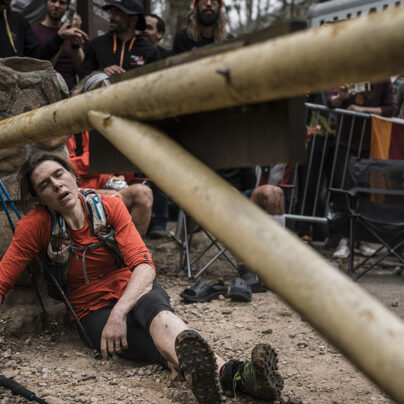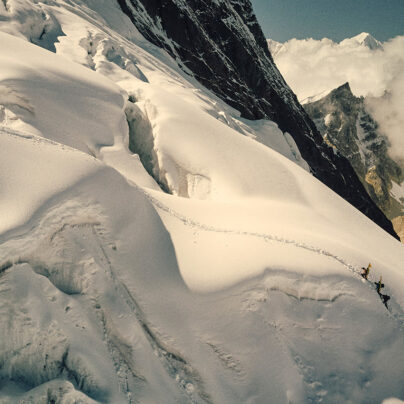Walking Borneo
David Atthowe
My heart was racing as I first set eyes on the target, a giant, black wild boar. Taman Kala silently prepared the blowpipe constantly aware of every small sound or movement in the environment. In went a poison dart and silently he drew in a deep breath ready to fire. In an instant he shot, the dart flew through the air and was a direct hit straight through the eye of the wild boar. The boar fell straight to the ground and was quickly finished off. As I looked up at Taman Kala’s face he had the biggest, widest grin shining across his face; today, he was the victor.
Our journey to visit the Penan began in the Kelabit settlement of Long Seridan; a modern village that has become a transition town for Penan moving from traditional Nomadic lifestyles to a settled agricultural lifestyle. A half day’s walk later we made it to the last village of recently settled Penan communities. We were warmly welcomed into a small, simple wooden house built entirely from nearby forest resources with a cup of coffee and a big smile.
We were shown around the small village by a young Penan man called Winisen who spoke good Malay and soon became our translator as we walked around the village meeting all the people. As we ambled around the main open field we suddenly caught glimpse of an old small house, raised off the ground and right on the edge of the forest. The house belonged to Budik Kusin, Winisen’s grandmother who still held a deep attachment and affinity for the forest. She had an old, wise face with the Penan’s long, hanging traditional earlobes and a piercing gaze that penetrated deeply. For more than 65 years she had been wondering nomadically in these jungles and still preferred to be as close as possible to the trees, the animals and the greenery.
Her small house was full of everything a person could need to hunt, gather, carry, cut and survive in the jungle. She had a reputation as a master weaver, traditional singer and musician. As we entered the dark little house and our eyes slowly adjusted to the change in light we saw sat in the corner an interesting looking piece of bamboo. She noticed my perplexed gaze and happily picked it up and started to play the most beautiful song. A real raw, organic sound resonated as she plucked the strings of her Pagong the crickets and cicadas seemed to respond and join in a perfect harmony; the rhythm of the jungle.
At first light in the morning after more coffee and a small breakfast we met with Taman Kala, who along with Winisen would walk with us for the next 10 days. Armed with a machete, an all-natural rattan backpack, a blowpipe and a holster full of poison darts we were ready to go. It was a hot sticky morning with humidity up to 100% and the route was very tough going. Almost immediately we came to our first obstacle a 200m rock face, it very quickly came apparent the Penan were masters of balance; they seemed to be able to dance barefoot around any obstacle.
Armed with a machete, an all-natural rattan backpack, a blowpipe and a holster full of poison darts we were ready to go. It was a hot sticky morning with humidity up to 100% and the route was very tough going.

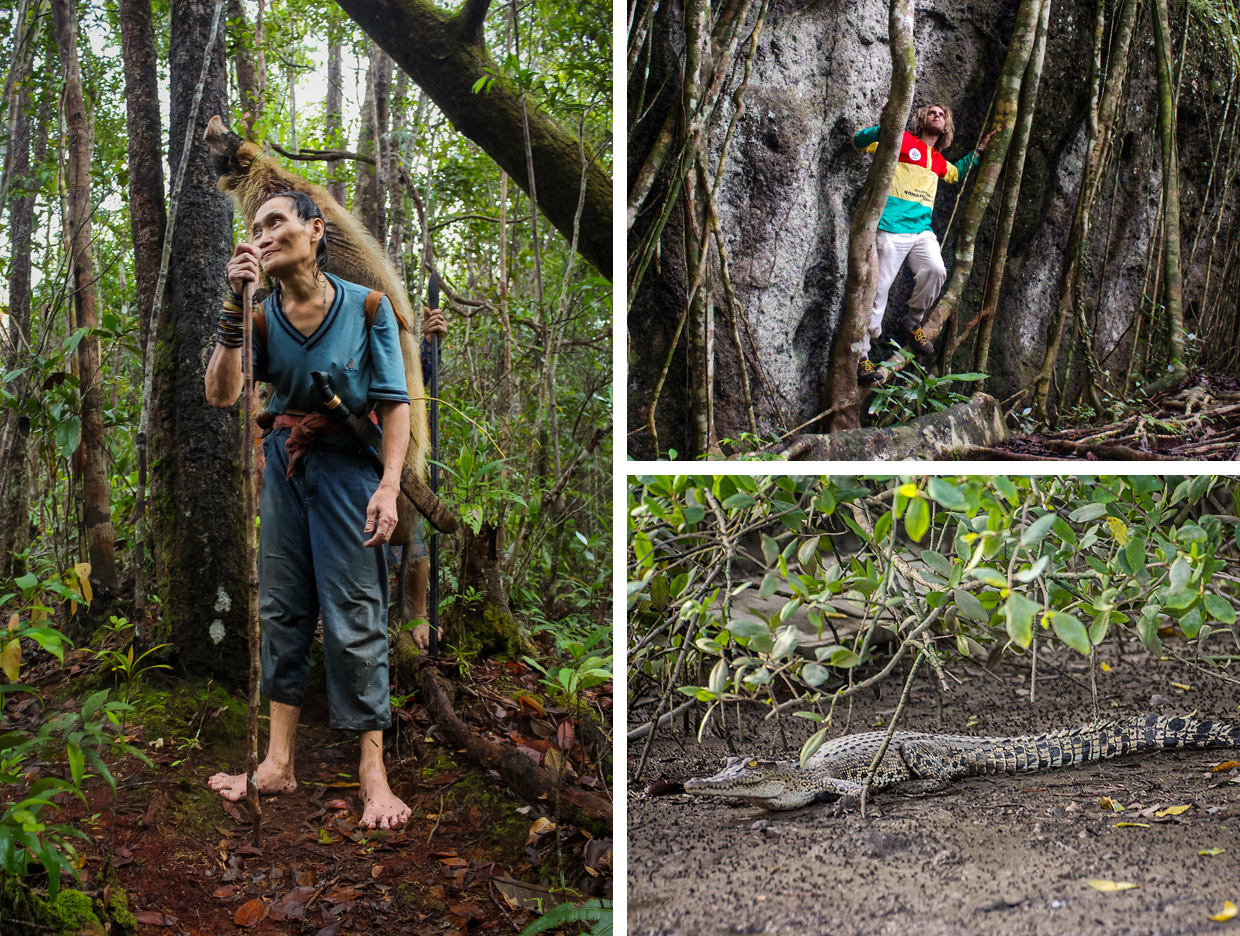
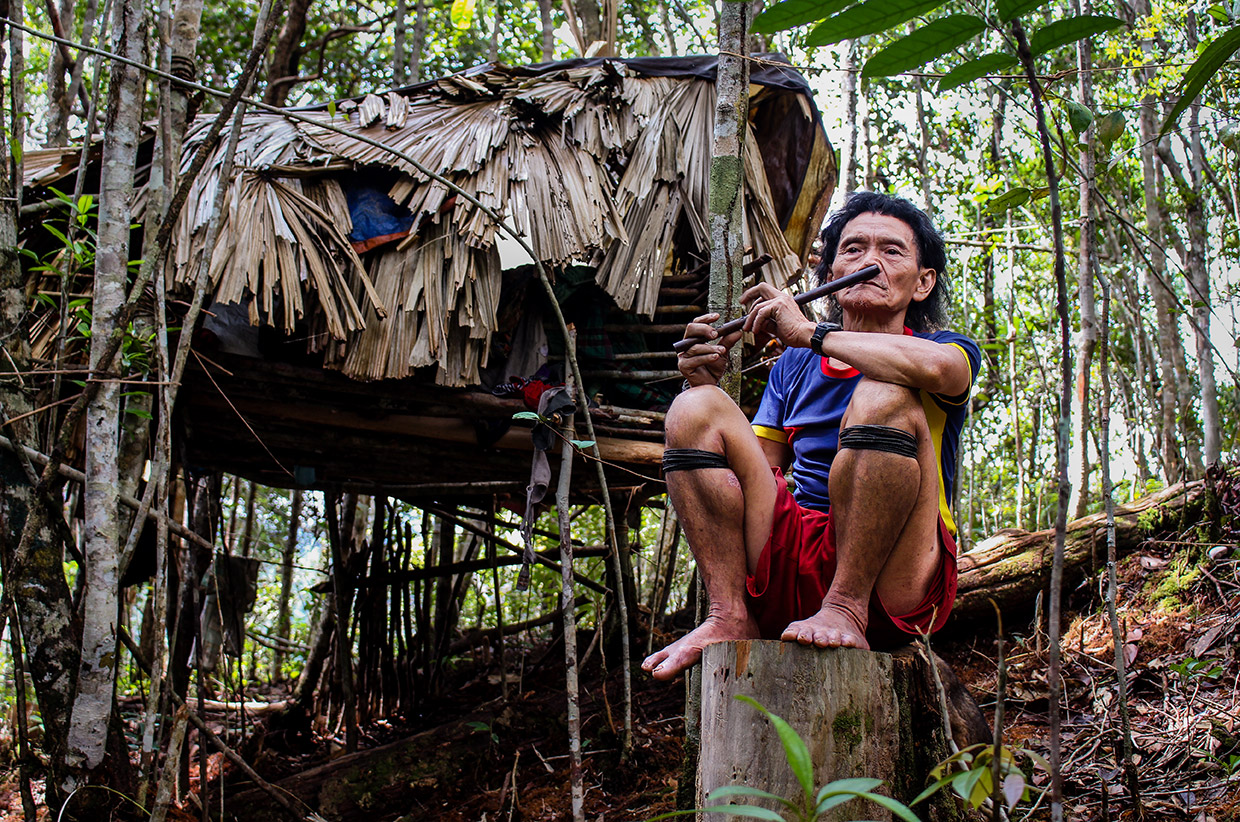
Taman Kala reappeared with a blowpipe in his left hand and a dead owl in his right; good omen or not, owl is very much on the Penan’s menu. After a long day’s trek barbequed owl, sago, wild boar jerky and fermented pig fat tasted incredible!
As darkness started to fall we stopped and started to make camp. It was amazing to see the speed and ease with which Taman Kala built our shelter for the night. The floor and frame for the house was made from young trees bound together with rattan and the roof from the leaves of a nearby shrub. In just 30 minutes we had a rainproof, safe and secure shelter for the night made entirely from materials found within 100 metres.
As we prepared the fire we heard a distinct cry of a bird. Taman Kala’s face lit up, it was the sound of an owl, a good omen, the weather would be fine tomorrow. As the fire started to grow brighter and brighter Taman Kala disappeared along with his blowpipe. 30 minutes later he reappeared with a blowpipe in his left hand and a dead owl in his right; good omen or not, owl is very much on the Penan’s menu. After a long day’s trek barbequed owl, sago, wild boar jerky and fermented pig fat tasted incredible!
The next day we faced a new obstacle, a fast flowing river with no way around. We took turns at hacking down the biggest tree in the area with a small hand axe. After about 30 minutes with a large crack and a giant splash the tree came down and fell almost perfectly across the river. Now the real challenge began, walking across a thin, wet and slippery tree trunk to the other side. There was no room for error, heavy rain the night before had left the river fierce and swollen, falling in would have had serious consequences.
After crossing the river we started up a sharp incline, heading uphill through thick jungle for a few hours. Suddenly we reached the top of the hill where there was a big clearing that revealed the stunning beauty of the Penan’s home. As far as the eye could see was rolling hills of thick jungle with the famous pinnacles of Gunung Mulu just visible in the distance.
On the third day we made it to the last known location of the nomads. The camp had been abandoned and the Penan had moved on. All that was left was empty houses which were slowly decomposing and returning to the forest from where they came.
Our group split into 2 as Taman Kala quickly picked up the trail of the Penan’s movements. My body was overflowing with a mix of excitement and nervous apprehension as we entered into the Penan’s camp. There were just 5 small houses that blended in perfectly with the forest. The first person to see us was a young boy, no more than 5 years old who took one look and turned white, petrified he ran inside bawling and crying for his father.
Our return was a family reunion, Taman Kala was returning to see his grandmother, it had been almost 5 years since they had last met and we were all given a very warm welcome. We climbed the small ladder and entered inside one of the most ergonomically designed houses I’ve ever seen. The fire was burning bright and provided the only light inside, as our eyes slowly adjusted to the change in light once again my gaze was focused on an interesting piece of bamboo. My gaze caught the attention of Taman Kala’s brother who picked it up, placed it in front of his nose and gave a beautiful performance of how to play a nose flute. Almost as soon as he played his last note his wife burst into song, she had a piercing, haunting voice that touched us deep within. As she sang I closed my eyes and looked within, this was it! We were really here, deep in the jungles of Borneo alongside the Penan.
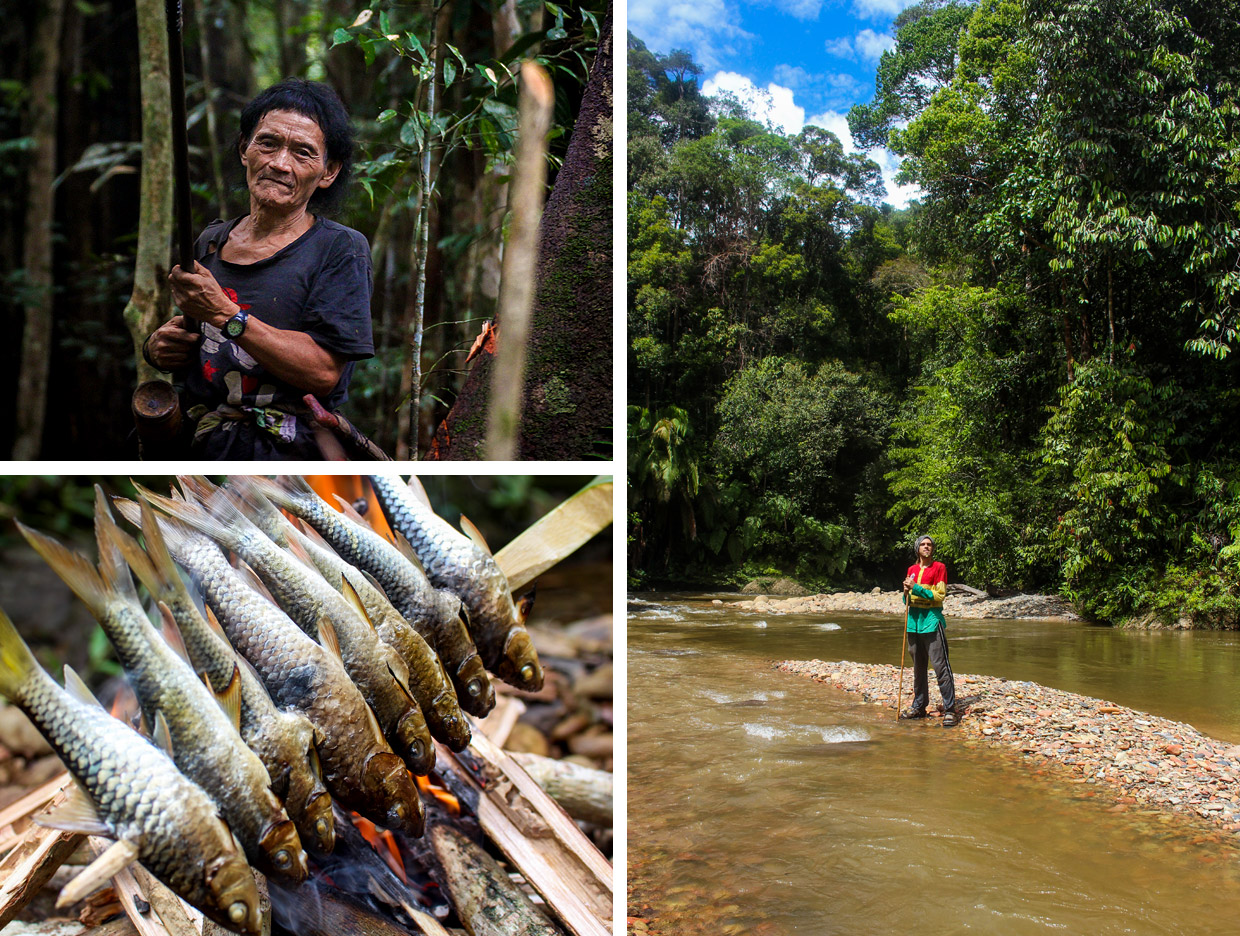
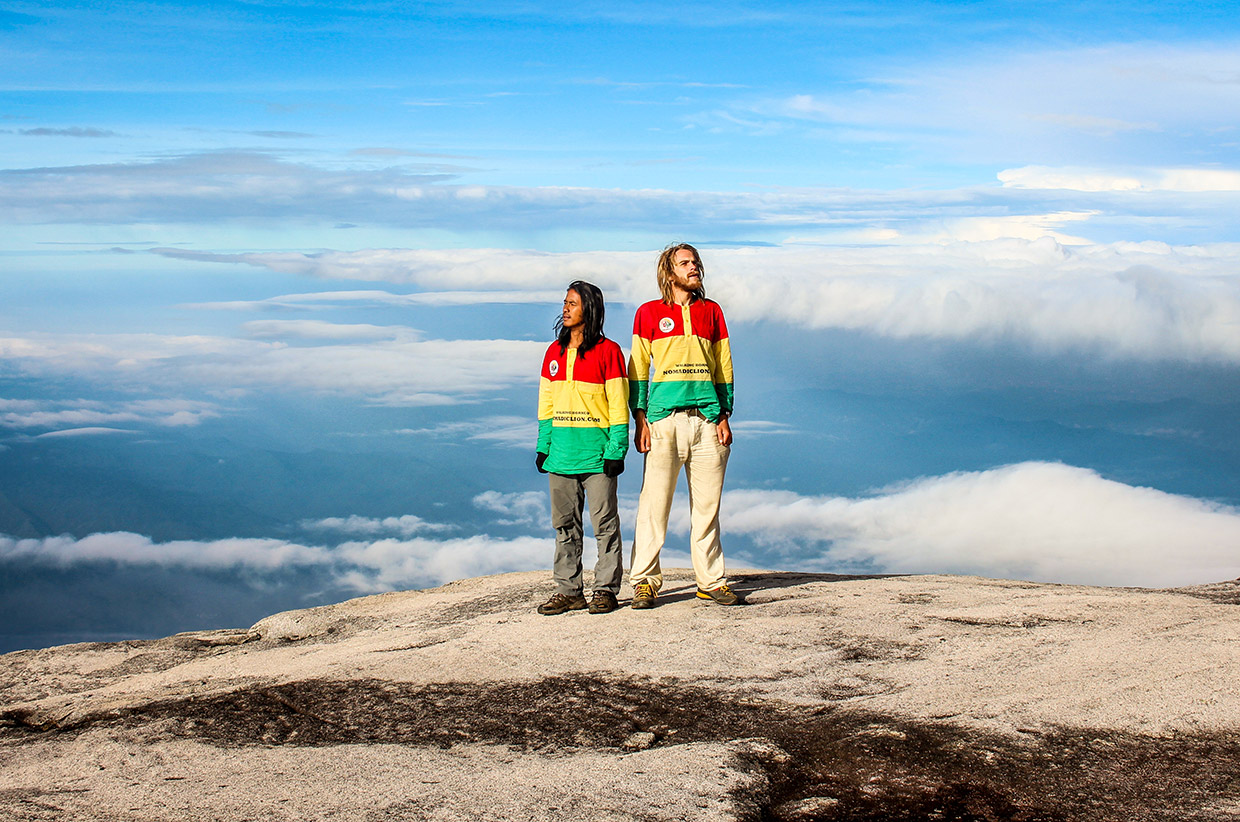
We spent the next week living and moving with the community. It would be hard to find a better teacher for living nomadically and moving in the rainforest, we learned so much in such a short period of time. The Penan; nomadic masters of the jungle who can appear and disappear silently at will, who can find a natural cure for almost any disease and who live completely at one with the forest.
They are famous for their great sense of community and sharing all with everybody. No matter how big or small the catch the Penan will carefully and equally divide it between everybody in the community. In the words of Taman Kala; “We share all, the jungle will provide for tomorrow.”
One day we were relaxing after a morning hunt and I asked one of the village elders why do you live nomadically? His answer is something most Nomads could understand and will have felt, it really hit home and resonated with us:
“We were all born to move, when we sit still we become agitated, we feel sick on the inside, our hearts feel sick.”
During Walking Borneo, we had the pleasure of moving through the jungle with a number of different tribes and jungle survival experts but none of them came close to the Penan. Their ability to disappear and reappear at will seemed to defy logic. The most striking aspect of walking alongside them was their constant state of hyper-awareness, wide eyed and constantly reading their environment. It seemed like they were using a sixth sense, a primal survival sense most of us in the modern world have long since forgotten.
The Penan have always been a peaceful tribe; the exception in an island with a rich history of headhunting and warring tribes. Rather than fight and risk death they have always preferred to simply flee deeper into the jungle. The problem is today they are fast running out of jungle to flee to as new threats encroach on their ancestral homelands.
Walking Borneo is Nomadic Lion’s second project; their first project was “Walking Malaysia” – A 1100km across Peninsular Malaysia. Up next? Their big dream – “Walking Asia”. Walking the entire length of Asia, crossing 20 countries and taking 4 years. The biggest participatory walk ever in Asia involving millions of people.
Nomadic Lion is a 3 man team: David Atthowe, from Norwich, UK, Yusep Sukmana from Ciamis, Indonesia and Gilang Yaksapurusa from Bandung, Indonesia, all 26 years old. Nomadic Lion is simply 3 people’s dream, their vision: “Walking to share the joy of art and happiness with millions of people.”
They want to create and support a network of NGO’s, projects and creative spaces, offering arts to disadvantaged youth across Asia. To bring the joy of arts to those who would never normally get the opportunity.
Walking Borneo began in Tawau, Sabah on the 22nd August and finished on the 4th of January in Kuching, Sarawak, covering a total distance of 2250km entirely on foot.
Website: www.nomadiclion.com
Facebook: /nomadiclion
Twitter: @nomadic_lion
Instagram: @nomadiclion


